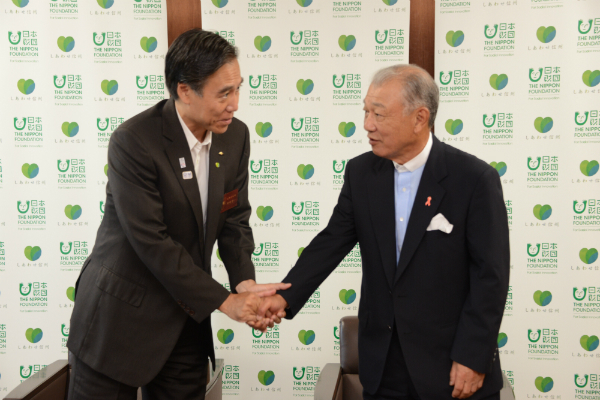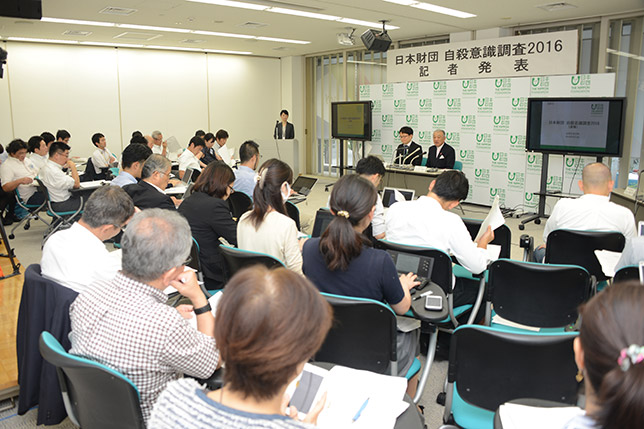The Nippon Foundation Suicide Prevention Project
One in four people in Japan “seriously considers suicide.” This is one of the findings that emerged from The Nippon Foundation Suicide Awareness Survey 2016, carried out by The Nippon Foundation to coincide with the World Health Organization’s World Suicide Prevention Day. In Japan, 24,000 people took their own life in 2015. The Nippon Foundation launched The Nippon Foundation Suicide Prevention Project after the passage in April 2016 of revisions to the Basic Act on Suicide Countermeasures. Based on the results of The Nippon Foundation Suicide Awareness Survey 2016, The Nippon Foundation is pursuing measures to provide comprehensive support to enable these people to live.
Suicide in Japan Today
Japan’s suicide rate stands out among the G7 countries,* and Japan is the only one of those countries where suicide is the leading cause of death among young people. Suicide tends to be viewed as an individual’s problem, but in most cases the person feels like they have no choice – as a result of social issues like becoming unemployed or struggling to make a living, excessive debt, or overwork. These deaths can be seen as “preventable” if social countermeasures are implemented. A major revision to the Basic Act on Suicide Countermeasures enacted in April 2016 requires all prefectures, cities, towns, and villages to implement suicide countermeasure strategies. The aim is that no matter where in Japan a person lives, they will receive support for suicide prevention in the form of “comprehensive support for living,” so that no one will feel driven to suicide.
Three Components of The Nippon Foundation Suicide Prevention Project
The Nippon Foundation Suicide Prevention Project aims to create a society in which everyone who has a desire to live is able to, even when they face difficulties or feel driven into a corner. The project has three components: (1) Formulation of “implementation models” with local governments to prevent suicide; (2) Countermeasures against suicide by young people; and (3) Surveys and public awareness related to suicide.
(1) Formulation of “implementation models” with local governments to prevent suicide
Major revisions were made to the Basic Act on Suicide Countermeasures in 2016, the 10th anniversary of the law’s enactment. The main revision was the inclusion of a requirement that all prefectures, cities, towns, and villages implement suicide countermeasure strategies. The project will initially work with two local governments at the forefront of this process – Nagano Prefecture and Tokyo’s Edogawa Ward – to formulate plans based on the circumstances in each location. Formulating plans that can be used by local governments at the prefectural, city, town, and village level will lead to suicide countermeasures nationwide.

| Local governments involved | Nagano Prefecture; Edogawa Ward, Tokyo |
|---|---|
| Date of signing | September 14, 2016 (Nagano); July 8, 2016 (Edogawa) |
| Period of agreement | From date of signing to March 31, 2020 |
| Partner | Lifelink (suicide prevention NGO) |
| Areas covered |
|
(2) Countermeasures against suicide by young people
The Nippon Foundation Suicide Awareness Survey 2016 clearly shows that the percentage of young people (ages 20 to 39) who have had suicidal thoughts or have attempted suicide is higher than for other age groups. The Nippon Foundation will create a framework for resolving problems faced by young people with suicidal thoughts, so they do not feel isolated.
- Personal support to prevent depression and suicide
Partner Light Ring Details Friends, romantic partners, and family members of persons facing difficulties will be taught how to support those persons, so that they can receive support from people close to them. Consultations will be held with people in their 20s and 30s on how to provide support, and these people will be put in touch with other supporters, to prevent depression and suicide among persons providing as well as persons receiving support. - Creation of an internet-based crisis intervention model
Partner OVA Details Focusing on the use of search-linked advertising, consultation and support will be provided via chat forums and telephone to people who search the internet for terms that indicate suicidal thoughts (e.g. “I want to die”). When necessary, organizations in other locations will be contacted to assist with face-to-face consultation.
Jiro Ito, OVA’s president, was recognized as a social innovator at The Nippon Foundation Social Innovation Forum 2016.
(3) Surveys and public awareness related to suicide
The project will clarify and shed light on the situation with regard to suicide in Japan and work to influence public opinion, leading to appropriate countermeasures.

| Details | Carrying out of a survey that will lead to the promotion of suicide countermeasures: The Nippon Foundation Suicide Awareness Survey 2016 (survey of 40,000 people nationwide on their experiences related to suicidal thoughts and attempted suicides). |
|---|
Survey Results and Data
The survey results and data are available in Japanese only. For the Japanese versions, please visit our Japanese website.
For Counseling
When you have any trouble or concerns, or need to know English-speaking resources and support in Japan:
Free, anonymous telephone counseling and support is available in English at TELL Lifeline.
- Tel:03-5774-0992 (Free, 9:00 – 23:00 daily)
- For more information:TELL Japan website (external site)
- The Nippon Foundation does not have specialist facilities or staff for individual counseling.



